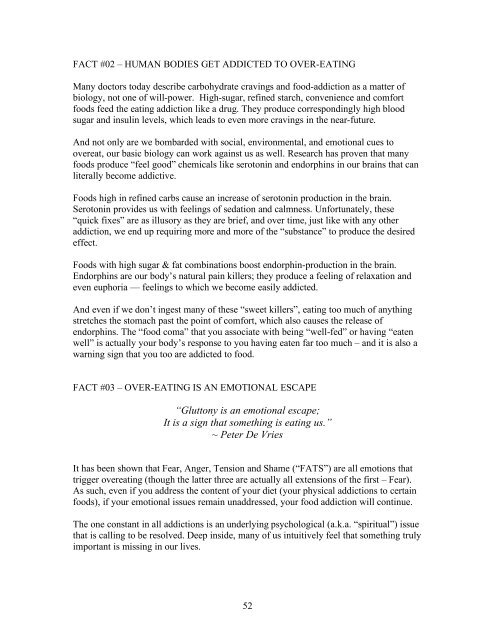Licking the Razor's Edge (2015)
Recognizing the hidden addictions that bind you, … to then set your True Self free
Recognizing the hidden addictions that bind you,
… to then set your True Self free
You also want an ePaper? Increase the reach of your titles
YUMPU automatically turns print PDFs into web optimized ePapers that Google loves.
FACT #02 – HUMAN BODIES GET ADDICTED TO OVER-EATING<br />
Many doctors today describe carbohydrate cravings and food-addiction as a matter of<br />
biology, not one of will-power. High-sugar, refined starch, convenience and comfort<br />
foods feed <strong>the</strong> eating addiction like a drug. They produce correspondingly high blood<br />
sugar and insulin levels, which leads to even more cravings in <strong>the</strong> near-future.<br />
And not only are we bombarded with social, environmental, and emotional cues to<br />
overeat, our basic biology can work against us as well. Research has proven that many<br />
foods produce “feel good” chemicals like serotonin and endorphins in our brains that can<br />
literally become addictive.<br />
Foods high in refined carbs cause an increase of serotonin production in <strong>the</strong> brain.<br />
Serotonin provides us with feelings of sedation and calmness. Unfortunately, <strong>the</strong>se<br />
“quick fixes” are as illusory as <strong>the</strong>y are brief, and over time, just like with any o<strong>the</strong>r<br />
addiction, we end up requiring more and more of <strong>the</strong> “substance” to produce <strong>the</strong> desired<br />
effect.<br />
Foods with high sugar & fat combinations boost endorphin-production in <strong>the</strong> brain.<br />
Endorphins are our body’s natural pain killers; <strong>the</strong>y produce a feeling of relaxation and<br />
even euphoria — feelings to which we become easily addicted.<br />
And even if we don’t ingest many of <strong>the</strong>se “sweet killers”, eating too much of anything<br />
stretches <strong>the</strong> stomach past <strong>the</strong> point of comfort, which also causes <strong>the</strong> release of<br />
endorphins. The “food coma” that you associate with being “well-fed” or having “eaten<br />
well” is actually your body’s response to you having eaten far too much – and it is also a<br />
warning sign that you too are addicted to food.<br />
FACT #03 – OVER-EATING IS AN EMOTIONAL ESCAPE<br />
“Gluttony is an emotional escape;<br />
It is a sign that something is eating us.”<br />
~ Peter De Vries<br />
It has been shown that Fear, Anger, Tension and Shame (“FATS”) are all emotions that<br />
trigger overeating (though <strong>the</strong> latter three are actually all extensions of <strong>the</strong> first – Fear).<br />
As such, even if you address <strong>the</strong> content of your diet (your physical addictions to certain<br />
foods), if your emotional issues remain unaddressed, your food addiction will continue.<br />
The one constant in all addictions is an underlying psychological (a.k.a. “spiritual”) issue<br />
that is calling to be resolved. Deep inside, many of us intuitively feel that something truly<br />
important is missing in our lives.<br />
52


















